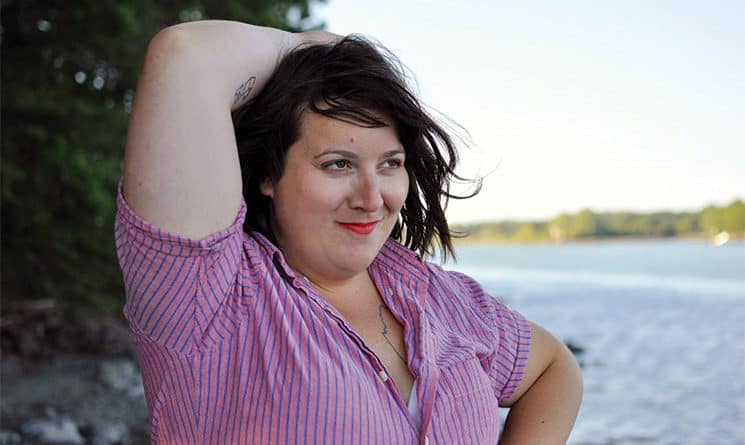Growing up, my mom used to tell my sister and me — but mostly me, because I was the fat one — about how her mother used to tell her that fat kids only got to wear brown clothes. That they only made clothes for chubby kids in brown. I have no idea if this was ever true. What I do know is that this story, while originally directed at my mother, was like a little gift of shame. Who knows where it started. The threat of brown clothing might have been many generations old. It’s possible the dreaded color wasn’t always brown, but whatever was the least fashionable color of the time. Mothers through the ages likely wielded different threatening colors. Morticia Addams probably threatened Wednesday with pink.
But this isn’t a story about being a victim or how my mother ruined me (obviously, because I’m effing awesome). That isn’t my intent and it wasn’t hers. She was just telling me a story her mother told her. It was a way of relating to my struggle with my body from a young age. It was her way of saying, “Aren’t you glad I’m not saying to you these terrible things my mother said to me?” Except that she was saying them, and I knew they were just as much about me as her. For years I lived in fear of brown clothes, always wondering where that line of “too fat for colors” lay.
This is a story about how you get from the impending doom of brown clothing to empowerment, body positivity, and self-love. There is no singular path, but my journey began with a realization about the brown clothing I once feared. I’m not certain exactly when it happened, but at some point I discovered the hypocrisy in the threat (likely as a late teen — boy, did I love to expose hypocrisy at that age).
You see, like so many kids, all my life, I’ve been told it’s what’s on the inside that counts. When you’re a fat kid, people tell you this ALL. THE. TIME. You hear it so often that it begins to sound more like, “By the way, did you know you aren’t good looking? But at least there’s your insides.” Or, “Oh, please let this child have the fortitude to endure a life of being fat.” That is to say, the expression shows itself for the very thinly veiled insult that it is.
At some point, I realized that the threat of brown clothing — and therefore its power — was completely predicated on the idea that what is on the outside DOES matter. Otherwise, your size, and the clothes you had to wear because of your size, wouldn’t matter. As long as you were smart and fun and had interesting things to say, you would be a goddamn superstar. But that just isn’t how it works.
“Self-love, like any love, requires maintenance. As soon as you start to take it for granted, it’s moving the other way.”
After years of hearing about the importance of my “insides,” I came to the understanding that what people really meant was that it’s what’s on the inside that should count. This is a huge semantic difference, and it holds the key to the barrier between the feel-good fantasy world we think we live in and the actual truth.
With this realization, I stood at a crossroads. I could either forge a path of self-love and gain the confidence to defend the stance that both my insides and outsides mattered and deserved to be loved (even if only by me), or I could just crawl under a rock (or into a non-descript brown jumper) and try not to be noticed. Thanks to a natural predilection toward irreverence and a soundtrack heavy on riot grrrl, I chose the former, and I haven’t spent much time looking back.
Step one for me was to stop acting like a temporarily inconvenienced skinny person. To stop believing I was afflicted, and to stop hoping no one would notice (or, God forbid, mention) that I was fat. Fatness is physical. All it means is that I literally have more fat on my body than average. That’s it. To come to a place where I loved myself, I was faced with the task of uncoupling the physical truth of fatness from so many culturally enforced implications: laziness, slowness, unintelligence, disinterest in health, weakness, taking up too much space. I had to stop believing all of that.
The journey toward empowerment is a slow and imperfect one. It’s not linear or predictable. It’s not as easy as simply knowing in your head that you deserve to be treated fairly by everyone, first of all yourself. Even after years, I still have moments where I let some of that negativity sink past the surface. Self-love, like any love, requires maintenance. As soon as you start to take it for granted, it’s moving the other way.
I talk about fatness because it is the thing that people notice first about me. It is what, to people who don’t know me, becomes my defining characteristic. It is how I would be described in a police report. In a world where the idea of a perfect body is so limited that literally not a single person I know fits it, and in a country where people are attacked, both verbally and physically, simply for their size and other aspects of their appearance, it is essential that we understand the commonality in what we face, and it is essential that we face it together.
To read more stories from Style Queue Magazine, click here.

